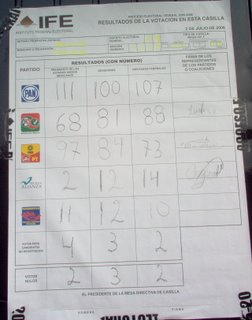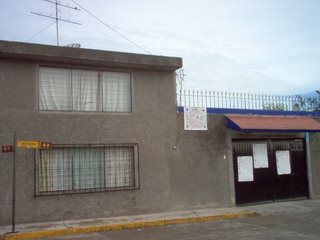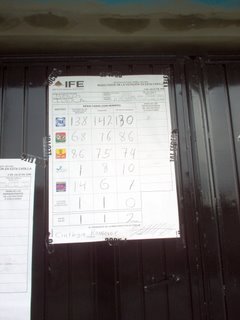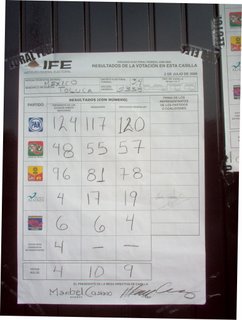



Election Day was transparent and civil, and perhaps joyous.
Before the days of hanging chads and fears that Diebold would steal votes electronically, there were the old paper ballots. I remember elections from the years 1956-1964 when my parents home in northern California was used as a precinct polling place. My parents were Republicans and our neighbors were Democrats, but we were all proud to come together and do our civic duties to make sure that votes were cast in an honest way.
Today, Sunday July 2, in Toluca is a deja vu. This time it is my house in Toluca being used as one of the nation´s 130,000 polling places. Two months ago, the Instituto Federal Electoral, IFE, called for volunteer locations, then visited our home and found it acceptable. Ten days ago they reconfirmed that everything was set and put out the sign on the house notifying the neighbors. They also put polling site information on the IFE website
http://www.ubicatucasilla.org.mx ("find your polling place") and have a toll free number giving that information 01-800-433-2000. Both the website and phone number appeared in most newspapers.
Friday a team of about four arrived to unload some of the equipment that would be needed on election day. The polls were to open to the public at 8:00 AM, and at 6:55 the IFE official, an energetic and efficient man named Mr. Vilchis, assigned to this precinct arrived. I got out to tie up the dogs and back out the vehicles so that IFE could do the final set up with the ballots and boxes and purple ink markers. A half hour later, the line commenced, and although it never got a block long, it remained at least ten persons deep for hours.
What has impressed me most was the conduct of the election team and the voters. The team included official observers from each political party (properly identified by their buttons). The words which describe the people today are calm, upbeat, proud. Most brought their children to show them what democracy is like (and perhaps to talk about the bad old days of one party rule and phony elections). Many inexplicably drove to the polls in their cars (perhaps to show how everyone else how they are keeping up with the Garcias).
Several television stations had extensive election coverage of polling around the country. The reports show tranquility, a large turnout, and no major irregularities. In some places, people waited for over four hours in line to vote. Voting was going smoothly even in the "hot spots" of Oaxaca (a teacher's strike), Coahuila (disputes with miners over safety), and Atenco (where only a peaceful protest was staged).
There were belated photo-ops and sound bite moments for the candidates voting with their spouses in their home districts. As she had been throughout the campaign, Patricia Mercado was perhaps the most clear and eloquent when she said to reporters: "I am not here to proselytize, just to affirm my faith in the process." When asked if it was a scary day for her, she said that it would be better to describe the day as one that had been long hoped for. When asked what her plans were for the future, she pointed out: "That is for the voters to decide." I was also pleased to see one of Mexico's greatest living intellectual treasures, Carlos Fuentes, interviewed as he came out from voting. "Today the candidates don't count, it is we voters who count."
IFE is justifiably proud of its accomplishments, and the Mexican people should be proud of IFE. Fledgeling democracies in Afghanistan and Iraq have much to learn from Mexico (and dare I say, so does the U.S. electoral process).





